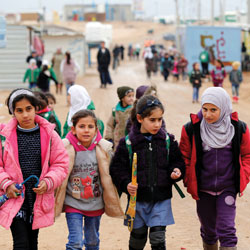
The EBRD is attempting to tackle one of the world’s worst humanitarian emergencies — the refugee crisis in the Middle East and North Africa — by fuelling private sector growth to deliver economic development, a technique that it has pioneered in central and eastern Europe. The bank is channelling a €900m ($980m) package of internal and donor-driven capital that it unveiled last year to create employment and deliver much needed public services to the homeless and displaced, Bank officials told GlobalMarkets.
The commercially-focused approach to funding private sector projects specifically designed to mitigate the plight of millions of refugees is a direct response to a crisis that has altered the politics of Europe, and forced Turkey and Jordan jointly to accommodate 3.4m Syrian refugees.
Heike Harmgart, head of office, Jordan, at the EBRD, said the funding was being used in part to finance much-needed infrastructure that would benefit both inhabitants and refugees. She highlighted a $24m investment in the Water Authority of Jordan, which will finance a 30km pipeline linking the capital, Amman, with a wastewater plant in the north of the country. The new facility will serve 1.78m people, including hundreds of thousands of displaced Syrians.
“We are financing infrastructure projects in areas where there are lots of refugees, with a focus on services like the delivery of clean forms of energy, and the treatment of waste water and solid waste,” she said. Amman is struggling to cope with the additional 25% in solid waste it has to process every day — a direct result of the humanitarian crisis that continues to engulf the region.
CLOSE TO BREAKING POINT
Janet Heckman, head of the bank’s Southern and Eastern Mediterranean Region, pointed to the focus to deliver clean water to towns and districts encircling the northern city of Irbid, which lies just 10km from Jordan’s border with Syria. “The inhabitants — and the refugees — used to get clean water once every week,” she says. “Now, it’s every day. It doesn’t solve the wider problem, of course, but it does make the situation more tenable for host countries.”
EBRD’s hopes of opening its inaugural office in Lebanon by the end of the year will help it focus on similar and much-needed projects. In March, Lebanon premier Saad al-Hariri said his country, struggling to cope with a million Syrian refugees, was “close to breaking point”.
The bank is also investing heavily in projects that improve the prospects for women across the region. Barbara Rambousek, lead inclusion economist at the EBRD, said more than 5,000 jobs had been created in Jordan and Turkey. An $80m loan that underpinned the construction of the $300m Abdali Mall in Amman, built to international environmental specifications, had led to the creation of jobs for 200 young and female Jordanians, Rambousek added.
Suma Chakrabarti, the EBRD’s president, said: “The refugee crisis has been a test case for us. We invest a lot in the SME sector through local banks and that sector has to grow to absorb this extra labour that’s there. You can see that with our focus on training and advisory services for those who want to become entrepreneurs.”
